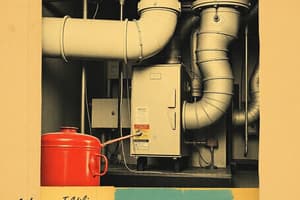Podcast
Questions and Answers
A higher ______ rating means lower operating costs.
A higher ______ rating means lower operating costs.
efficiency
The ______ is a ratio of useful heating or cooling provided to work (energy) required.
The ______ is a ratio of useful heating or cooling provided to work (energy) required.
coefficient of performance
Furnaces are rated by the ______ ratio, which is the percent of heat produced for every dollar of fuel consumed.
Furnaces are rated by the ______ ratio, which is the percent of heat produced for every dollar of fuel consumed.
Annual Fuel Utilization Efficiency
The ______ measures the energy efficiency of a heat pump over an entire heating season.
The ______ measures the energy efficiency of a heat pump over an entire heating season.
The ______ is the ratio of the cooling capacity (in British thermal units (Btu) per hour) to the power input (in watts).
The ______ is the ratio of the cooling capacity (in British thermal units (Btu) per hour) to the power input (in watts).
An ______ rating measures how well your AC turns electrical energy into cold air.
An ______ rating measures how well your AC turns electrical energy into cold air.
The Integrated Part Load Value (_____) is a weighted average efficiency at part-load capacities.
The Integrated Part Load Value (_____) is a weighted average efficiency at part-load capacities.
______ is a mathematically determined ratio of the total cooling capacity during normal periods of operation divided by the total electric energy input during the same time period.
______ is a mathematically determined ratio of the total cooling capacity during normal periods of operation divided by the total electric energy input during the same time period.
The Heating Seasonal Performance Factor (_____) is a term used in the heating and cooling industry.
The Heating Seasonal Performance Factor (_____) is a term used in the heating and cooling industry.
The Energy Utilization Index (_____) is a metric used to measure the energy efficiency of a building.
The Energy Utilization Index (_____) is a metric used to measure the energy efficiency of a building.
AHRI Standard 550/590 sets testing conditions that apply to describe chiller performance in ______ at various part-load operating capacities.
AHRI Standard 550/590 sets testing conditions that apply to describe chiller performance in ______ at various part-load operating capacities.
The ______ is measured by the amount of energy a building uses per square foot per year.
The ______ is measured by the amount of energy a building uses per square foot per year.
Flashcards
Higher efficiency rating
Higher efficiency rating
Indicates lower operating costs.
Coefficient of Performance (COP)
Coefficient of Performance (COP)
Ratio of useful heating/cooling provided to work (energy) required.
Annual Fuel Utilization Efficiency (AFUE)
Annual Fuel Utilization Efficiency (AFUE)
Percent of heat produced for every dollar of fuel consumed by a furnace .
Seasonal Coefficient of Performance (SCOP)
Seasonal Coefficient of Performance (SCOP)
Signup and view all the flashcards
Energy Efficiency Ratio (EER)
Energy Efficiency Ratio (EER)
Signup and view all the flashcards
AC Efficiency Rating
AC Efficiency Rating
Signup and view all the flashcards
Integrated Part Load Value (IPLV)
Integrated Part Load Value (IPLV)
Signup and view all the flashcards
Seasonal Energy Efficiency Ratio (SEER)
Seasonal Energy Efficiency Ratio (SEER)
Signup and view all the flashcards
Heating Seasonal Performance Factor (HSPF)
Heating Seasonal Performance Factor (HSPF)
Signup and view all the flashcards
Energy Utilization Index (EUI)
Energy Utilization Index (EUI)
Signup and view all the flashcards
AHRI Standard 550/590
AHRI Standard 550/590
Signup and view all the flashcards
Energy Utilization Index (EUI)
Energy Utilization Index (EUI)
Signup and view all the flashcards
Study Notes
Efficiency Ratings
- An efficiency rating measures how well an air conditioner (AC) turns electrical energy into cold air, with a higher rating indicating lower operating costs.
- Energy consumption through heating and cooling represents a significant portion of energy utility costs for most households.
Furnace Efficiency
- Annual Fuel Utilization Efficiency (AFUE) is a ratio of heat produced for every dollar of fuel consumed, with a higher rating indicating lower fuel costs.
Heat Pump and Refrigerator Efficiency
- Coefficient of Performance (COP) is a ratio of useful heating or cooling provided to work (energy) required, with higher COPs equating to higher efficiency and lower operating costs.
Heat Pump Efficiency
- Seasonal Coefficient of Performance (SCOP) measures the energy efficiency of a heat pump over an entire heating season.
- Heating Seasonal Performance Factor (HSPF) is a term used to measure the efficiency of air source heat pumps, defined as the ratio of heat output to electricity used over the heating season.
Air Conditioner Efficiency
- Energy Efficiency Ratio (EER) is a ratio of the cooling capacity to the power input, with a higher EER rating indicating a more efficient air conditioner.
- Seasonal Energy Efficiency Ratio (SEER) is a mathematically determined ratio of the total cooling capacity to the total electric energy input during a specific time period.
Chiller Efficiency
- Integrated Part Load Value (IPLV) is a weighted average efficiency at part-load capacities, often used to describe chiller performance in kW/ton at various part-load operating capacities.
Building Efficiency
- Energy Utilization Index (EUI) is a metric used to measure the energy efficiency of a building, calculated by the amount of energy a building uses per square foot per year.
Studying That Suits You
Use AI to generate personalized quizzes and flashcards to suit your learning preferences.




